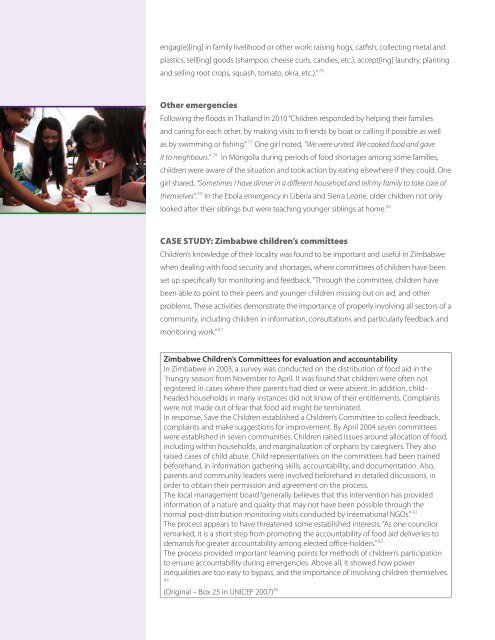putting-children-at-the-heart_full_text_final
putting-children-at-the-heart_full_text_final
putting-children-at-the-heart_full_text_final
- No tags were found...
You also want an ePaper? Increase the reach of your titles
YUMPU automatically turns print PDFs into web optimized ePapers that Google loves.
engag(e)[ing] in family livelihood or o<strong>the</strong>r work: raising hogs, c<strong>at</strong>fish, collecting metal and<br />
plastics, sell[ing] goods (shampoo, cheese curls, candies, etc.), accept[ing] laundry, planting<br />
and selling root crops, squash, tom<strong>at</strong>o, okra, etc.).” 76<br />
O<strong>the</strong>r emergencies<br />
Following <strong>the</strong> floods in Thailand in 2010 “Children responded by helping <strong>the</strong>ir families<br />
and caring for each o<strong>the</strong>r, by making visits to friends by bo<strong>at</strong> or calling if possible as well<br />
as by swimming or fishing.” 77 One girl noted, “We were united. We cooked food and gave<br />
it to neighbours.” 78 In Mongolia during periods of food shortages among some families,<br />
<strong>children</strong> were aware of <strong>the</strong> situ<strong>at</strong>ion and took action by e<strong>at</strong>ing elsewhere if <strong>the</strong>y could. One<br />
girl shared, “Sometimes I have dinner in a different household and tell my family to take care of<br />
<strong>the</strong>mselves”. 79 In <strong>the</strong> Ebola emergency in Liberia and Sierra Leone, older <strong>children</strong> not only<br />
looked after <strong>the</strong>ir siblings but were teaching younger siblings <strong>at</strong> home. 80<br />
CASE STUDY: Zimbabwe <strong>children</strong>’s committees<br />
Children’s knowledge of <strong>the</strong>ir locality was found to be important and useful in Zimbabwe<br />
when dealing with food security and shortages, where committees of <strong>children</strong> have been<br />
set up specifically for monitoring and feedback. “Through <strong>the</strong> committee, <strong>children</strong> have<br />
been able to point to <strong>the</strong>ir peers and younger <strong>children</strong> missing out on aid, and o<strong>the</strong>r<br />
problems. These activities demonstr<strong>at</strong>e <strong>the</strong> importance of properly involving all sectors of a<br />
community, including <strong>children</strong> in inform<strong>at</strong>ion, consult<strong>at</strong>ions and particularly feedback and<br />
monitoring work.” 81<br />
Zimbabwe Children’s Committees for evalu<strong>at</strong>ion and accountability<br />
In Zimbabwe in 2003, a survey was conducted on <strong>the</strong> distribution of food aid in <strong>the</strong><br />
`hungry season’ from November to April. It was found th<strong>at</strong> <strong>children</strong> were often not<br />
registered in cases where <strong>the</strong>ir parents had died or were absent. In addition, childheaded<br />
households in many instances did not know of <strong>the</strong>ir entitlements. Complaints<br />
were not made out of fear th<strong>at</strong> food aid might be termin<strong>at</strong>ed.<br />
In response, Save <strong>the</strong> Children established a Children’s Committee to collect feedback,<br />
complaints and make suggestions for improvement. By April 2004 seven committees<br />
were established in seven communities. Children raised issues around alloc<strong>at</strong>ion of food,<br />
including within households, and marginaliz<strong>at</strong>ion of orphans by caregivers. They also<br />
raised cases of child abuse. Child represent<strong>at</strong>ives on <strong>the</strong> committees had been trained<br />
beforehand, in inform<strong>at</strong>ion g<strong>at</strong>hering skills, accountability, and document<strong>at</strong>ion. Also,<br />
parents and community leaders were involved beforehand in detailed discussions, in<br />
order to obtain <strong>the</strong>ir permission and agreement on <strong>the</strong> process.<br />
The local management board “generally believes th<strong>at</strong> this intervention has provided<br />
inform<strong>at</strong>ion of a n<strong>at</strong>ure and quality th<strong>at</strong> may not have been possible through <strong>the</strong><br />
normal post-distribution monitoring visits conducted by intern<strong>at</strong>ional NGOs.” 82<br />
The process appears to have thre<strong>at</strong>ened some established interests: “As one councilor<br />
remarked, it is a short step from promoting <strong>the</strong> accountability of food aid deliveries to<br />
demands for gre<strong>at</strong>er accountability among elected office-holders.” 83<br />
The process provided important learning points for methods of <strong>children</strong>’s particip<strong>at</strong>ion<br />
to ensure accountability during emergencies. Above all, it showed how power<br />
inequalities are too easy to bypass, and <strong>the</strong> importance of involving <strong>children</strong> <strong>the</strong>mselves.<br />
84<br />
(Original – Box 25 in UNICEF 2007) 85


